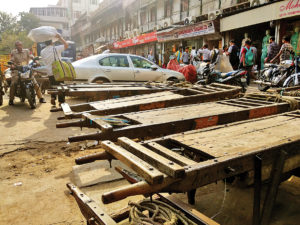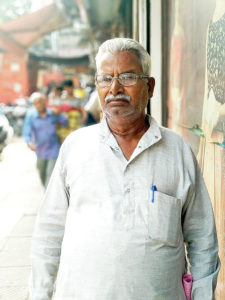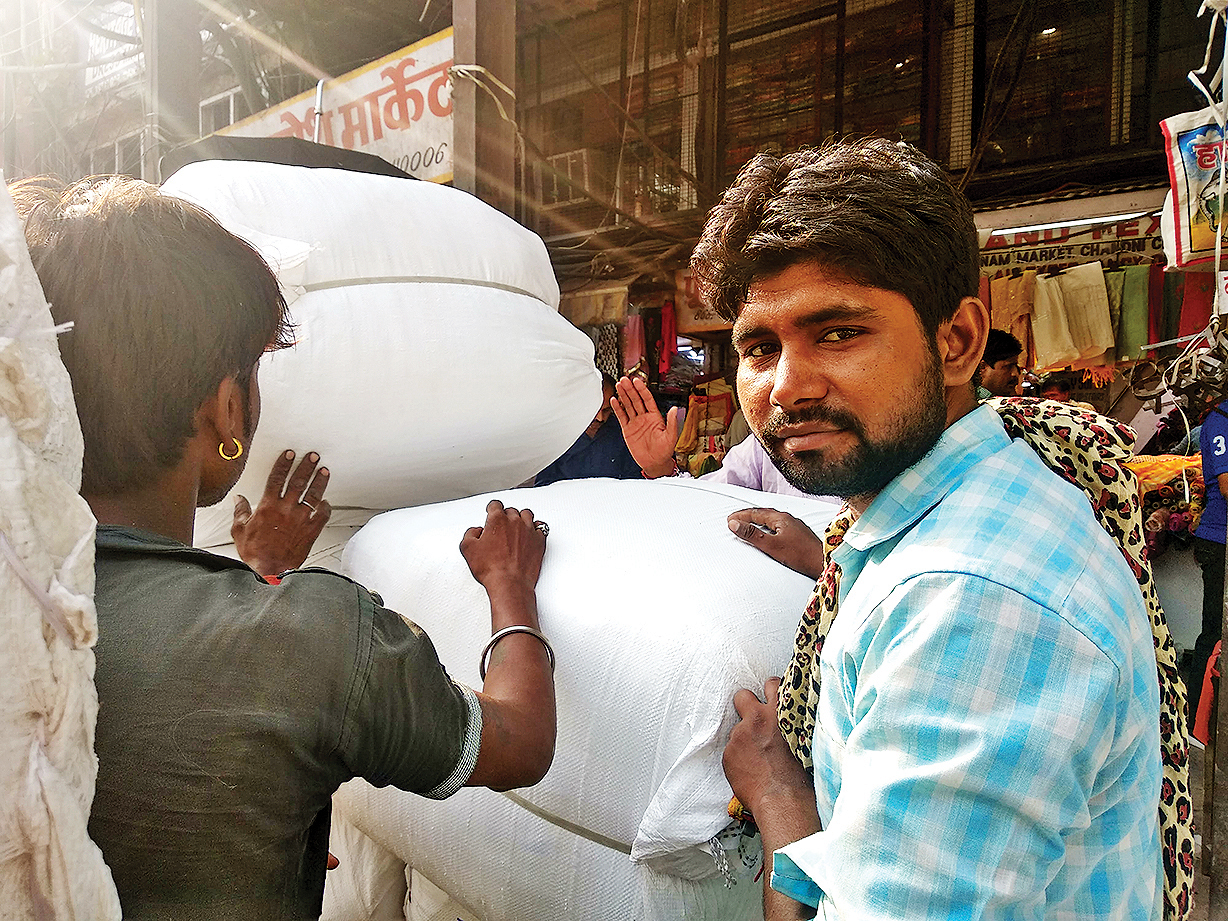The porters in the Chandni Chowk area have been hit hard by the construction that is part of the redevelopment works. Patriot speaks to some of them to understand their current condition
Dust, traffic and congestion — three words which are quite apt to describe the present state in the Chandni Chowk area in Delhi. Being one of the oldest markets in the Capital, Chandni Chowk is currently going through a redevelopment phase. The aim is to make the main lane of the market, traffic free, and pedestrian friendly.
Here we try to understand the loss of business that the porters in the area are currently facing due to this.
Sitting under a sacred fig tree, the porters in the area are seen taking rest on the stationed carts. Hotilal Kashyap, 73, their pradhan, while holding a pink bundle in his right hand says, “I have to give the parcel slips to each porter so that they can give it to the truckwala at the loading station at the back of the market.”
Kashyap says that he came to Delhi in 1962 from Aligarh and was first working as a film copy distributor in the Capital. As technology took many turns and continued changing the way people consume content, it made Kashyap too, change his profession. He settled for being a porter in the Chandni Chowk area and has been working in this field since 1970.
“Kaam toh ab kya hi reh gaya hain. Khane se zyada toh hum log mitti kha lete hain,” tells Kashyap. Standing under the scorching sunlight, Kashyap in his white kurta, is sweating profusely as he continues talking about the problems that the porters are facing nowadays.

He goes on to say that the number of the businessmen, who used to come Chandni Chowk to purchase goods and take it back with them, has also drastically reduced..
Dust is another major issue for the porters in the area. Kashyap in the middle of the conversation thanks the rain and continues, “before it started raining, the whole area was under dust due to construction, it was unbearable.”
He jokes, “I only eat 5-10 grams of dust while being here the whole day.” All the others porters earn around Rs 350 to Rs 400 per day, and if on any day they get lucky, the earnings touch Rs 500, which is not “sufficient for them.”
Since these porters have to carry goods weighing 80 to 100 kgs and more, diet is the only thing which keeps them working. Kashyap says that hardly any porter takes a break between 5 am to 12 noon because that’s the time when the market sees businessmen coming in huge numbers, after that the streets are dominated by regular customers.
Kashyap too, eats his second meal of the day around 1pm, which usually includes roti and sabzi, while channa keeps him running throughout the day.
The work has become more tedious now because the way to the loading station is more congested — which means what earlier used to take 15-20 minutes, takes an hour now. This, Kashyap says, has “increased the labour cost too.” The current rate is between Rs 70 to Rs 100, depending on the distance from the shop to the destination.
However, since the construction has started, the rate has remained same, even though the operating time has increased. “Since the first person won’t return anytime soon and there could 2-3 big parcels to be delivered to the truck. We now have to assign three people to guard the parcels because earlier two people could do the work and return in no time,” he says.

Once the supply is ready to be sent to the loading station, from point A to point B, the responsibility falls on these porters, along with the weight of the goods.
He also tells that some people in the area, like the paan-walas, also take money to guard goods on an hourly or per day basis. Police on the other hand, keeps ordering the porters to vacate the spot in order to “ease the traffic situation in the lane.”
“Some police officers take hafta and in return, they let some porters keep their carts in place,” Kashyap adds.
Most of the porters here say that the major issue that they face is the struggle to find work. When Muzir Khan, 22, came to Delhi from Gonda (UP), little did he know that his idea of earning some good money for himself, would fade in the air filled with dust.
“When I came here three years ago, I used to earn about Rs 1,000 to Rs 1,200 in a day and now I hardly make more than Rs 500,” says Khan.
Khan is gearing up for the evening, when all the porters will resume work again, right now they’re loading the goods onto their carts.
Currently, he is confused over his future because when the market is being transformed and given the pedestrian only status, Khan doesn’t have much idea as to where he will go.
However, he adds that the traders told the porters that some space will be made available at the back of the main lane for the porters to operate their business and also to park their carts.
As the market sees rush in the afternoon and early evening, most porters rest and wait for the lanes to become traffic free. “Earlier, we used to get done with the loading bit by 10 or 11 in the morning, but now, it gets done in shifts,” he says.
Earlier, they used to rest in the afternoon but now they have to load the goods on the cart during that time. “Sometimes when there is heavy traffic, we just stand there waiting for the road to get cleared, he says.
As Khan remains tensed about his work and earnings, another porter who does wishes to be anonymous, says, “As long as I get daaru (liquor) and chakhna (snacks) in the evening, I’m fine.” For him, his earnings should cover his evening drinking sessions.
But for other porters in the area, the future remains uncertain. Their earnings have dropped by 30-40 per cent. Even as the redevelopment of the area is expected to better the lives of the people working here, with no work and little pay, the lives of the porters remain in limbo.





